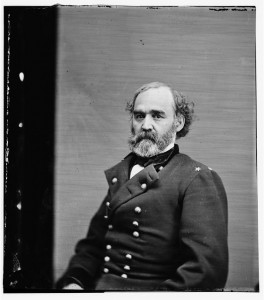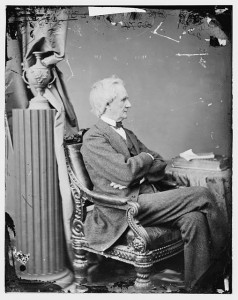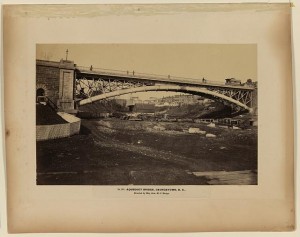As Civil War Daily Gazette has reported 150 years ago President Lincoln accepted the retirement of General Winfield Scott and directed that George McClellan take command of the Army of the United States. You can read Lincoln’s order at Classic Reader.
Apparently the Northern armies that McClellan will be overseeing are in dire need of warm clothing as winter approaches. From The New-York Times November 1, 1861:
CLOTHING FOR THE ARMY.; LETTER FROM THE QUARTERMASTER-GENERAL.
QUARTERMASTER-GENERAL’s OFFICE,
WASHINGTON CITY, Oct. 22, 1861.
Sir: The within communication from the Board of Trade of Boston has been handed to this office with a request to transmit it to the Secretary of War.
The matter has been discussed with the Secretary, and I am of opinion that the order to inspect and purchase an extra quantity of cloth was a wise one, and ought not to be revoked. While the public, not truly advised as to the orders of the Government, and excited by reports such as have been published in certain newspapers, that the Government had sent out a credit L5,050,000 or $25,000,000, and in other papers that $60,000,000 had been sent out, may misjudge it, the fact is that it is proposed only to spend $800,000 in these purchases, and to purchase and ship only for instant and pressing wants of the service.
Governors daily complain that recruiting will stop unless clothing is sent in abundance and immediately to the various recruiting camps of regiments.
With every exertion, this Department has not been able to obtain clothing to supply these demands, and they have been so urgent that troops before the enemy have been compelled to do picket duty in the late cold nights without overcoats, or even coats, wearing only the thin Summer flannel blouses.
The want of clothing more than the want of money discourages enlistments. This Department would gladly pay cash and provide clothing, but it has not been able to satisfy the demands for either one or the other and as promptly as the service demands.
The financial question is in the hands of the capitalists, the merchants, and the Treasury Department.
Should the Board of Trade be right in its opinion, and the domestic manufactories be able to supply regulation cloth enough before cloth can be imported from Europe, it will gladly be purchased at any reasonable prices, and made up into clothing.
Could 150,000 suits of clothing — overcoats, coats, and pantaloons — be placed to-day in depot, it would scarcely supply the calls now before me. They would certainly leave no surplus.
Very respectfully, your obedient servant,
M.C. MEIGS, Quartermaster-General.
To the Hon. SIMON CAMERON, Secretary of War, War Department.
Born in Augusta, Georgia Montgomery C. Meigs was a career United States army officer who worked as an engineer before the Civil War. He was The Quartermaster General throughout and beyond the war. From Wikipedia:
Of his work in the quartermaster’s office, James G. Blaine remarked, “Montgomery C. Meigs, one of the ablest graduates of the Military Academy, was kept from the command of troops by the inestimably important services he performed as Quartermaster General. Perhaps in the military history of the world there never was so large an amount of money disbursed upon the order of a single man … The aggregate sum could not have been less during the war than fifteen hundred million dollars, accurately vouched and accounted for to the last cent.” Secretary of State William H. Seward’s estimate was “that without the services of this eminent soldier the national cause must have been lost or deeply imperiled.”




Pingback: Mitten Knittin’ | Blue Gray Review